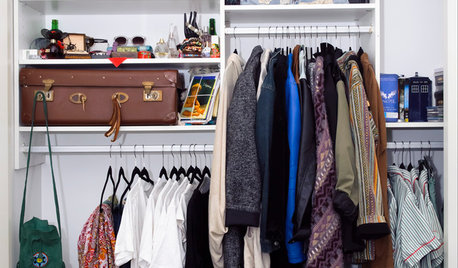how much down payment needed in new real estate world?
chicagoerin
14 years ago
Related Stories

SELLING YOUR HOUSE15 Questions to Ask When Interviewing a Real Estate Agent
Here’s what you should find out before selecting an agent to sell your home
Full Story
HOUSEKEEPINGWhen You Need Real Housekeeping Help
Which is scarier, Lifetime's 'Devious Maids' show or that area behind the toilet? If the toilet wins, you'll need these tips
Full Story
CLOSETSDesign Your Closet for the Real World
Let a professional organizer show you how to store all your clothes, shoes and accessories without blowing your budget
Full Story
MOST POPULARArchitectural Icon: The World’s First Bauhaus House
The Haus am Horn in Weimar is the first architectural example from the famed school, and the only one in the German city where Bauhaus began
Full Story
HOUZZ TOURSMy Houzz: Sophisticated, Old-World Charm for a Dallas Rambler
Warm wood tones and secondhand finds shine in this first-time homeowner’s home
Full Story
TRADITIONAL HOMESMy Houzz: A Centuries-Old French Estate Charms Again
Time and local artisans help a couple realize an idyllic French country retreat — and you can rent it
Full Story
LIFESurprising Ways to Pare Down at Home
All those household items you take for granted? You might not need them after all. These lists can help you decide
Full Story
MY HOUZZMy Houzz: With TLC, a Former Dutch Nursery Estate Blossoms
A family buys a run-down estate in the Netherlands and brings it back to life
Full Story
DECORATING STYLESWorld of Design: 11 Secrets of British Eccentric Style
Playfulness, humor and imperfection are some of the elements common to this unconventional way of decorating
Full Story
HOW TO PHOTOGRAPH YOUR HOUSEAttract Home Buyers Easily With Great Photography
Show your home's best face in real estate listing photos to have potential buyers knocking down your door
Full StorySponsored
Central Ohio's Trusted Home Remodeler Specializing in Kitchens & Baths
More Discussions








Linda
ncrealestateguy
Related Professionals
West Jordan Architects & Building Designers · American Canyon General Contractors · Clive General Contractors · East Riverdale General Contractors · Fairview General Contractors · Green Bay General Contractors · Jefferson Valley-Yorktown General Contractors · Mobile General Contractors · Riverside General Contractors · Rocky Point General Contractors · Rolla General Contractors · Spring Valley Home Stagers · The Hammocks Home Stagers · Clinton Township Interior Designers & Decorators · Hagerstown Interior Designers & Decoratorsbrickeyee
c9pilot
karen_76
Billl
chicagoerinOriginal Author
brickeyee